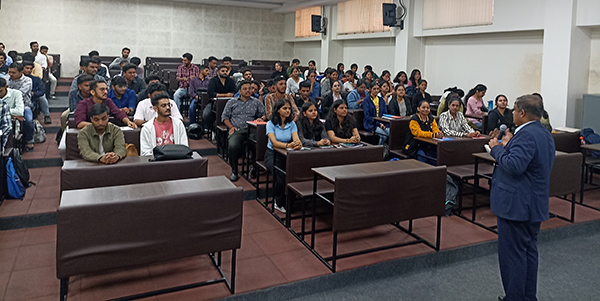Centre for Professional Excellence and Lifelong Learning (CPELL)
About CPELL
Centre for Professional Excellence and Lifelong Learning (CPELL) caters to building purposeful learning into each individual’s professional life. A cluster of well experienced trainers with expertise in human relations, social capital management, legal aspects, technology integration in education, social psychology and social dynamics have been training professionals from various backgrounds and fields of life. The Centre conducts training programmes across the country for various Governmental and Non-Governmental organizations. The centre also welcomes collaborative partnership with the right organizations for developing competent human resources and to promote organizational excellence.
Vision
To empower individuals in their profession by helping them navigate through the right path in becoming high-potential professionals.
Mission
To develop leadership skills that can prepare individuals to become expert in their fields with efficient abilities and skills.
Objectives
- To provide corporate team building and team bonding ensuing workplace communication skills.
- To train professionals in creating a healthy interpersonal relationship which would eventually develop positive ambience at workplace.
- To help individuals develop self-confidence and help professionals manage work- life balance and emotional stress management.
List of Training Programmes offered by CPELL
On Class Room Management, Teacher & Student Relationship
- 1. Curriculum Design
- 2. Assessment Strategies
- 3. Classroom Management
- 4. Teaching a Diverse Student Population
- 5. Differentiated Instruction
- 6. Technology in the Classroom
- 7. Strategies for Engaging Students
- 8. Growth Mindset in Education
- 9. Positive Behavior Interventions and Supports
- 10. Understanding and Supporting Students with Special Needs
- 11. Constructivism in the Classroom
- 12. Early Childhood Education
- 13. Creating and Enhancing Engaging Learning Environments
- 14. Understanding the Common Core Standards
- 15. Best Practices for Literacy Instruction
- 16. Differentiating Instruction for Gifted Learners & Learners with specific needs
- 17. Creating an Inclusive Classroom Environment
- 18. Building Positive Classroom Culture
On Social Media Management
- 1. Understanding Social Media Basics
- 2. Establishing Professional and Ethical Boundaries
- 3. Developing an Online Professional Presence
- 4. Creating Engaging Content for social media
- 5. Utilizing social media to Enhance Student Engagement
- 6. Using social media for Professional Development
- 7. Leveraging social media to Promote School Events
- 8. Developing an Effective social media Policy
- 9. Addressing Digital Citizenship and Digital Literacy
- 10. Managing Social Media addiction of the learners
On Technology & Education
- 1. Introduction to Educational Technology
- 2. Using Technology to Support Differentiated Instruction
- 3. Creating Digital Content for the Classroom
- 4. Digital Citizenship and Online Safety
- 5. Utilizing Mobile Devices in the Classroom
- 6. Teaching with Google Classroom/LMS
- 7. Integrating Technology into the Curriculum
- 8. Creating a Flipped Classroom
- 9. Designing Online Assignments
- 10. Using Technology for Assessment and Evaluation
- 11. Utilizing Data to Guide Instruction
- 12. Implementing Blended Learning
- 13. Strategies for Troubleshooting Technology in the Classroom
- 14. Using Augmented and Virtual Reality in the Classroom
- 15. Integrating Technology into the Special Education Classroom
- 16. Designing Online Courses
- 17. Using Technology for Professional Development
- 18. Instructional Strategies for Technology-Based Learning
On Law & Education
- 1. Understanding Legal Requirements for School aspects Policies and Procedures
- 2. Rights and Responsibilities of Teachers and Students
- 3. Understanding the Rights of Special Education Students
- 4. Strategies for Working with Difficult Parents
- 5. Avoiding Legal Pitfalls in the Classroom
- 6. Understanding Liability Issues in the Classroom
- 7. Developing Effective Student Discipline Policies
- 8. Understanding Education Laws and Regulations
- 9. Negotiating the Legal Maze of Education Policy Making
For Students: Employability Enhancement Skills
- 1. Communication Skills
- 2. Time Management
- 3. Resume Writing
- 4. Decision Making
- 5. Conflict Resolution
- 6. Teamwork
- 7. Networking
- 8. Problem Solving
- 9. Leadership
- 10. Interpersonal Skills
- 11. Professionalism
- 12. Negotiation
- 13. Creative Thinking
- 14. Public Speaking
- 15. Stress Management
- 16. Adaptability Skill
- 17. Emotional Intelligence
- 18. Organizational Skills
- 19. Listening Skills
- 20. Presentation Skills
On NEP
- 1. Understanding the National Education Policy (NEP) 2020
- 2. Role of Teachers in Implementing the NEP
- 3. Creating New Learning Experiences for Students Under NEP
- 4. Redefining the Curriculum and Assessments Under NEP
- 5. Incorporating Multidisciplinary Learning for Students Under NEP
- 6. Exploring New Opportunities for Professional Development Under NEP
- 7. Understanding the Focus on Digital Education Under NEP
- 8. Promoting Inclusion and Equity in Education Under NEP
- 9. Understanding the Role of Technology in Implementing NEP
- 10. Developing 21st-Century Skills for Students Under NEP
For School Principals / Administrators
- 1. Understanding Educational Trends and Practices
- 2. Working with Gen Y and Z Teachers and Staff
- 3. Strategic Planning and Analysis
- 4. Curriculum Design and Evaluation
- 5. Technology Integration in Education
- 6. Creating a Safe and Healthy Learning Environment
- 7. Effective Communication and Conflict Resolution
- 8. Leadership and Motivation
- 9. Understanding the Legal and Regulatory Framework
- 10. Community Relations and Outreach
- 11. School Improvement Strategies
- 12. Professional Development of School Leaders
- 13. Creating and Maintaining a Positive School Culture
- 14. Time Management and Prioritization
- 15. Data-Driven Decision Making
- 16. Building a Positive School Climate
- 17. Social and Emotional Learning
- 18. Cultural Competence and Inclusivity
- 19. Financial Management
For more information, please contact:
Dr Jonas Richard A or Mr. Suku Thomas Samuel or Ms Sowmya Simon
Faculty Coordinators
Centre for Professional Excellence and Lifelong Learning (CPELL)
Kristu Jayanti (Deemed to be University), Bangalore
cpell@kristujayanti.com
Mobile Numbers: 9448532577/9611032032/9845212989
Details of Training Conducted
Student Orientation Training Lakshya at Kristu Jayanti CMI Public School, Kannamangala
Date: 19 & 20 May 2025
On May 19th and 20th, 2025, Kristu Jayanti College's Centre for Professional Excellence and Lifelong Learning (CPELL) collaborated with Kristu Jayanti CMI Public School in Kannamangala to organise a two-day student orientation programme called Lakshya. The initiative aims to empower kids in grades 5 to 10 by assisting them in discovering their potential and developing confidence through entertaining and enlightening workshops. The seminars were led by faculty from various Kristu Jayanti College departments, including Computer Science, Media Studies, Commerce, English, and Psychology. The curriculum addressed important topics such as empathy and emotional balance, career guidance, time management, good study habits, communication skills, decision-making, health and hygiene, self-awareness, stress management, emotional intelligence, leadership, and interpersonal skills. Students eagerly participated and responded positively to the lessons, which they found practical and interactive. Students reported feeling more motivated, confident, and prepared to confront academic and personal obstacles. The program closed on a reflective note, emphasising the significance of such activities in influencing students' overall growth. Lakshya successfully taught young students vital life skills, fostering both personal development and academic accomplishment.

Scholastics Training Programme for St. Joseph CMI Province, Kottayam, Kerala
Date: 19 May 2025
On May 19, 2025, the Centre for Professional Excellence and Lifelong Learning (CPELL) organized a one-day training program for 32 scholastics of the St. Joseph CMI Province, Kottayam, Kerala, at the Anugraha Retreat Centre. The session was led by Mr. Sen B. Mathews and Mr. Suku Thomas Samuel and inaugurated by Rev. Fr. James Neendussery CMI, Provincial Councillor for Evangelization & Pastoral Ministry. The program began with Mr. Suku sensitizing participants to key societal changes, including shifts in family structures, increased use of technology, widening generation gaps, and evolving perspectives. Mr. Sen followed with a session on organizational chemistry, helping the scholastics categorize community members and understand their roles in community building. The training featured engaging presentations, discussions, case studies, and interactive activities, all designed to deepen the scholastics' understanding of their roles as future community leaders. The program was a resounding success, equipping participants with valuable insights into societal dynamics and strengthening their formation process for the priesthood. Feedback from the attendees highlighted the program's relevance and effectiveness. The scholastics found the content and activities both motivating and essential to their responsibilities. The session underscored the importance of community leadership and provided practical tools for navigating modern challenges, leaving participants inspired and better prepared for their future roles.
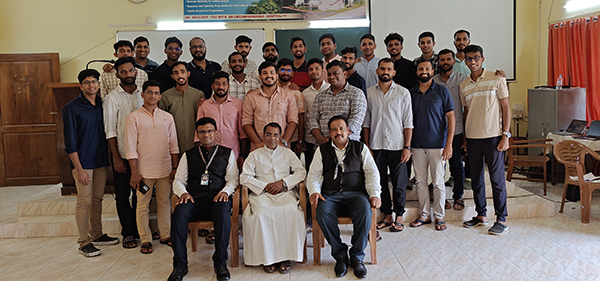
Teaching Reimagined: Nurturing a Growth Mindset & Empowering Educators for Excellence
Date: 16 & 17 May 2025
The Centre for Professional Excellence and Lifelong Learning (CPELL) successfully conducted a faculty training session on May 16 and 17, 2025, for teachers at Sacred Heart English Medium School, Mookkannoor, Kerala. Titled "Teaching Reimagined: Nurturing a Growth Mindset & Empowering Educators for Excellence," the session aimed to equip teachers with essential skills to adapt to changes in the educational landscape. During the training session, 42 teachers actively participated, making the session highly engaging and impactful. The training, conducted over two days, comprised discussions, activities, presentations, and games. It empowered teachers to align their academic efforts with their school's mission and objective to impart quality education. CPELL’s commitment to fostering excellence, practical learning, and career readiness was evident, reinforcing its dedication to student success.
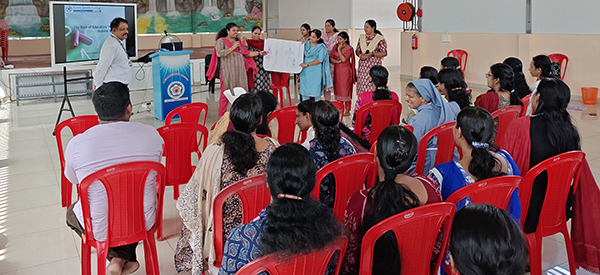
Teacher Development Programme (TDP) on Life Skills Education (LSE) at Herbert’s School, Imphal, Manipur
Date: 10 & 11 April 2025
St. Herbert School, Imphal, in collaboration with the Centre for Professional Excellence and Lifelong Learning (CPELL) of Kristu Jayanti College, Bengaluru, conducted a two-day Teacher Development Programme (TDP) on Life Skills Education (LSE) on April 10–11, 2025. Facilitated by Dr. Jonas Richard A and Mr. Vigraanth Bapu K G, the workshop engaged 25 teachers in interactive sessions designed to enhance their understanding and teaching of essential life skills such as self-awareness, empathy, communication, critical thinking, problem-solving, and stress management. The event was inaugurated by the school’s Principal, Dr. K. Nabachandra Singh, who highlighted the importance of integrating life skills into school education. Throughout the programme, participants took part in hands-on activities and explored themes like Looking Self in the , Walking in Another’s Shoes and Staying Calm in the Chaos. Teachers were introduced to innovative teaching strategies and classroom management techniques that promote the holistic development of students. The programme concluded with positive feedback from participants, who expressed greater confidence in applying life skills education in their classrooms and recognized its role in fostering student well-being and academic success.
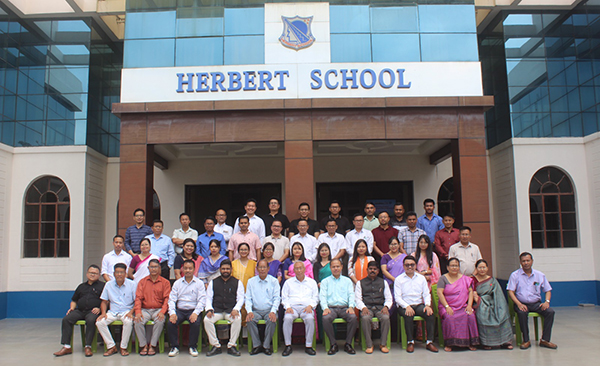
Students and Parents Counselling Session Conducted by CPELL at St. Michael’s High School
Date: 04 January 2025
The Centre for Professional Excellence and Lifelong Learning (CPELL) successfully conducted an engaging counselling session on January 4, 2025, for 10th-grade students and their parents at St. Michael’s High School, Geddalahalli, Bengaluru. Titled "Stress Management and Career Counselling," the session aimed to equip students with essential skills to navigate their board exams and make informed academic choices. Additionally, parents received valuable guidance on how to support and encourage their children during this crucial period. Dr. Diana Erudiyanathan, Assistant Professor in the Department of Management, facilitated the session, delivering practical strategies, real-world examples, and interactive discussions. A total of 70 students and parents actively participated, making the session highly engaging and impactful. This initiative empowered students to align their academic efforts with their career aspirations, leaving a lasting impression. CPELL’s commitment to fostering excellence, practical learning, and career readiness was evident, reinforcing its dedication to student success.
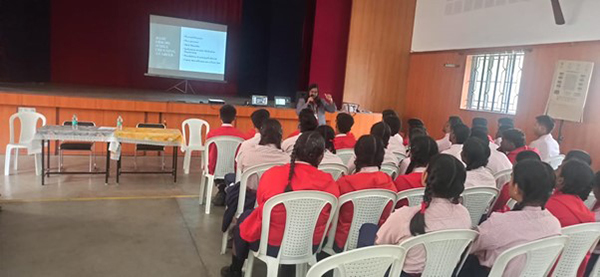
Student Orientation Training Session Conducted by CPELL at MS Ramaiah College
Date: 16 December 2024
The Centre for Professional Excellence and Lifelong Learning (CPELL) successfully conducted a dynamic training session on December 16, 2024, for the I semester MBA and MCA students at MS Ramaiah College of Arts, Science, and Commerce, Bengaluru. The session focused on the critical topics of Goal Setting and Communication, titled "Foundation of Excellence: Insights into Navigating Success" designed to equip students with essential skills for academic and professional success.
The training was facilitated by two experienced professionals, Mr. Sen B Mathews, Director of the Centre for Employability and Corporate Relations (CECR), and Mr. Suku Thomas Samuel, Programme Coordinator of the Department of Management. Hosted by Dr. Shaista B. Harris, Head of the Department of MBA, MS Ramaiah College of Arts, Science, and Commerce the session provided practical strategies, real-world examples, and interactive discussions to engage the 180 participating students. This impactful session inspired students to align their academic efforts with professional aspirations, leaving a positive and lasting impression. The initiative highlights CPELL’s dedication to fostering excellence, practical learning, and career readiness in students.
